12-15-09
Porumboiu’s Police, Adjective: Witnessing Our Times
By Diane Sippl
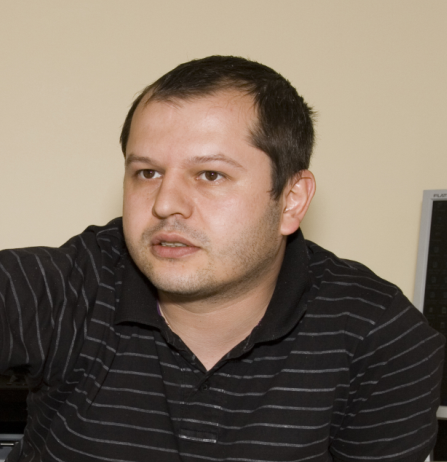
Writer-Director-Producer Corneliu Porumboiu
Internationally lauded for his highly original 12:08 East of Bucharest (shown at the 2007 PSIFF), a droll look at the quizzical moment of the Romanian Revolution as everyday citizens might have taken stock of it, Corneliu Porumboiu filled the screen again this year at the 2010 Palm Springs International Film Festival with his second feature and second critical hit, Police, Adjective. He began writing and visualizing his film by observing his own local environment, this time upon listening to the daily work reports of a friend who was a police officer in their home town of Vaslui. Then a newspaper story caught his eye: a man had informed on his brother for dealing hashish. Drawn neither to the crime itself nor to the court verdict, but to the police technique of shadowing and to the sibling betrayal, Porumboiu proceeded to make his own kind of “police procedural”— one about the mores of the culture and its relation to language.
What have words like “law” and “conscience” come to mean in Romania today? To show us (as if to find out for himself), Porumboiu used the camera as a voyeur on his protagonist, Cristi (Dragoş Bucur), who is also a professional voyeur of sorts, a local police investigator; Poroumboiu could thereby probe the crime movie genre as well — in fact, the film medium itself — in the same vein. This writer/director/producer delivers a wry send-up of the policier, “with the strong belief that cinema is witness to a meaningless world.”
Diane Sippl My first question is about your ideas, philosophy, and observations of life today in Romania. When a culture changes a lot, very quickly, there can be problems. Do you see Romanians learning how to change? What lessons are they learning in choosing their way?
Corneliu Porumboiu It’s a little bit complicated, because it’s coming from all Romanian history: the relation between the individual and the State was never liberal in Romania. So it takes time, I think — more time than I will live — because it’s also the attitude of the Orthodox religion. We never had the Protestant civilization that you had, that was very important in the West, so the right wing in Romania is not the right wing that you know in the Occident, in Western Europe.
DS Is the right wing usually religious, or just sometimes, in Romania and Romanian history?
CP I think it was all the time. But all the movies that I’ve made until now are about people living in transition. My first movie was deconstructing this word, “revolution,” because it’s a very romantic word for something that in fact doesn’t exist, doesn’t apply to our society, because after each revolution is a transition, and we forget about this. So all my movies are about living in this intermediate world. I’m living in an intermediate world, and I hope, into the future.
DS Do you have clear ideas of what you would like — your own vision?
CP For me I think this is the most important from a political standpoint: to change the rapport between the individual and the State. I think and I hope I’ll live in a Romania in which the individual will be important. Of course there are limits, but you know, an individual could change, at one point, their way of thinking. It’s related also to the conscience, the State conscience, the conscience of the nation — not in this very fragmented way. Each one has his own truth, but in the end, it’s under the State.
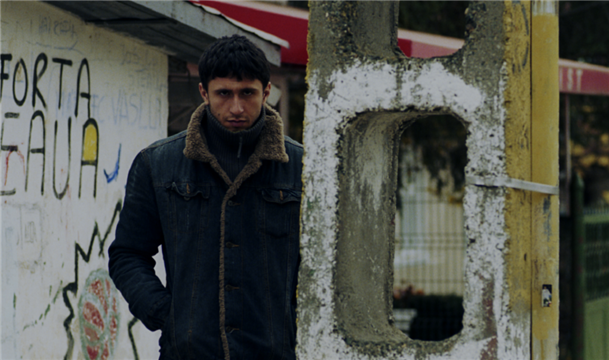
DS But you have a very nice, clear vision: that an individual could change a way of thinking; an individual can play a role in it. I think that in America lots of people gave up on that idea many years ago.
CP Ya, but I grew up with the American movies from the Seventies.
DS Okay, so you got the idea from us.
CP In a way, ya.
DS But that was the Seventies. Now we’re in another century.
CP Ya, but maybe you don’t know that all this “Hippie” period is very well known in Romania. It’s like a model. For example, after the revolution: right after it, my generation, of thirteen- and fourteen-year-olds, was at the beginning of the 1990s. This Hippie music was unbelievable. And it was hard, in a way, without drugs. Music like from Hair… It’s hard to imagine —
DS So our counter-culture came a generation later to Romania…
CP Two! No, it’s one — two decades, three maybe. Ya, but there are a few moments from America: I think all Romanians know the Watergate scandal, and there are some Kennedy moments. There are a few figures we really have in our consciousness.
DS So what we had in the Sixties and Seventies, you had in the Nineties.
CP It’s not that, but in a way these events influenced us. Yet it was like a reflection of the times, you know?
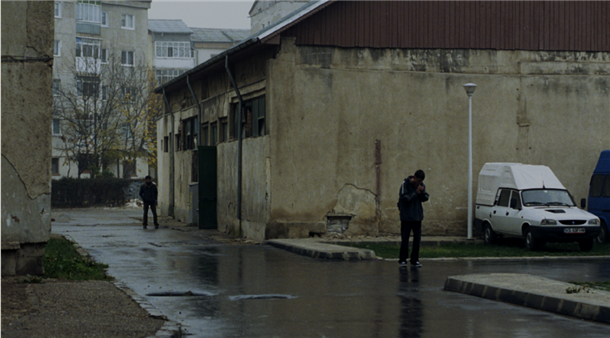
DS Okay, so what about your humor? In this film I saw lots of irony, a quiet and very sophisticated humor, but I didn’t hear anybody else laughing. It seemed people didn’t catch it. Have you noticed how people react to the humor in your film outside of Romania. Are there differences?
CP I have to say that I saw the movie entirely at Cannes. After that, the movie was finished for me on the screen. So I don’t want to see it for a period of time.
DS But you saw it in the audience at Cannes. So you got a reaction…
CP Yes, and it was a very international reaction, and they got the humor. A lot of people have told me that they notice it. Romanians, critics, people who see a lot of movies — they get it. But as a director, in fact you don’t have a connection with the real audience; you have parts of it.
DS Do you think it’s a dark humor, a black humor? Or for you is it just fresh and light?
PC Ha ha! I don’t know — it’s my nature; I don’t think before-hand. This is me. I think it’s quite cynical; it’s coming from my personality. When I make a movie, I don’t think in terms of, ‘I’ll make a comedy’ or ‘I want it to have humor’. No, it’s my point of view about the world.
DS Are you really interested in semiotics? Are you interested in a heavy way or more in an everyday-mainstream-culture way? You play with it a lot.
CP Ya, in my first movie, too. Of course, as a writer — because I also write my own scripts — I have this obsession with words, and what their meanings are. And each character is supposed to have his own vocabulary. You have to think like this for your everyday job. And after that, of course I’m thinking about it a lot, because in my movies there are these misunderstandings between people, and they are coming from this.
DS Do your characters each have their own languages, in a sense?
CP Ya, and they don’t get each other. They have their own perspectives about meanings. This is what I worked on in 12:08 and here, too.
DS Did you ever worry that this interest in language would make your film maybe too demanding for the audience?
CP My mother (now she died) was a Romanian teacher of language, so I grew up with it.
DS So for you it’s natural. For me, too. I love it. But some people think it’s dry, too intellectual.
CP In the first place, I don’t make movies now to earn money; I make movies that I like and that I want to show there, and I think I have my own audience. Of course I don’t expect to have millions of people.
DS Do you think there is a point of view or a cultural tradition that is particularly Romanian that the rest of the world should appreciate and notice?
CP I don’t think we have something particular — no; maybe it could be something like an Eastern European art conception. But no, I don’t think we have any kind of label, something more respected or with more reputation in our society that is different from the Eastern part of Europe.
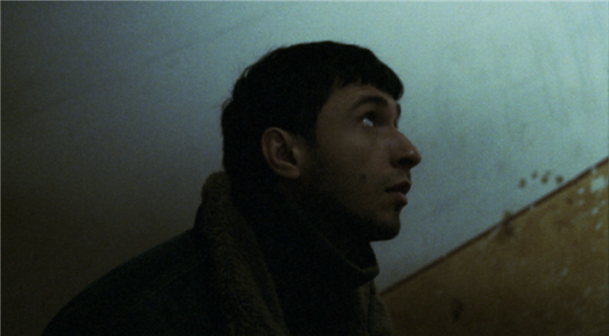
DS If you’re not making films for money, how did you get the money to make Police, Adjective, and was it the same way as with the last film? How do you get to make your films, and how does that affect what you get to do?
CP In Romania we have a system for grants
from the National Center of Cinematography.
You apply there with your script. If you're accepted, half of your budget is covered by the State, as in France,
and half could come from other sources. We imported French law, and the French system
with the National Center of Cinematography, which is an institution that has
State money.
DS And you raise half privately?
CP Privately, or as in
my case, you could make a co-production with France. This time I put the money in that I earned
with 12:08.
DS For me, your film calls
to mind Bresson’s Pickpocket, in the
way that the main character moves through space, a bit like a quiet predator
after his prey. And later, Police, Adjective recalls the
existential angst of Antonioni, especially as Cristi seeks an equilibrium in
his home, with his rather alienated wife.
In that scene, music bursts onto the screen with a distancing effect —
in fact coming from another screen, her computer — separating the worlds of Cristi and his wife. I think that whole sequence is ingenious.
CP Yes, I was influenced by Pickpocket, and the way that Bresson follows his character. He’s always opening doors and walking down corridors… At the same time, when I shot the long scenes with no dialogue, I was thinking about Antonioni’s Blow Up. Everything in Police, Adjective, especially the very long scenes with no action, highlights the absurdity in this world. Everyone is busy doing something else and nobody seems to think Cristi’s work is important. Finding time for people becomes a problem for the characters, so the film gradually turns into a movie about time.
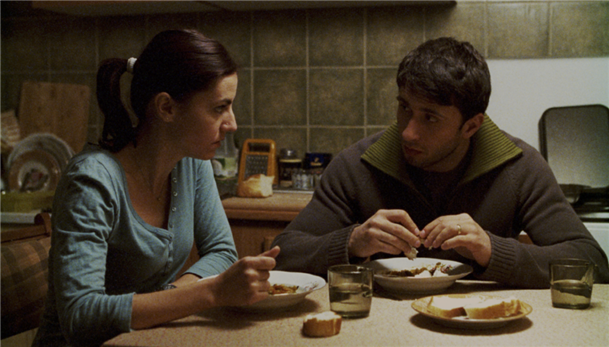
DS And maybe time on more than one level. How did you decide your cinematic style? A lot of this might apply to 12:08 as well, but I’m thinking now of just Police, Adjective: I noticed a generally stationary camera, long takes (in time) often with little action but with important and barely discernible detail, no musical score for the overall film, carefully scripted dialogue, and definitely location shooting. What do you think makes up your style? How do you think of style, anyway? What role does it play for you?
CP A movie should be a point of view about the world and a point of view about cinema. So I like movies that allow me, at the same time that I’m writing the script, to be thinking like a director. And I will launch the script that gives me the opportunity to research the movie and make it in the cinematical language that I want. I’m obsessed with using real time on the screen. I like to tell stories in the third person; therefore the camera is always quite detached, and it has a distance. Also, I’m thinking about the movie in terms of tone and rhythm, as in music. So far as editing goes, or rhythm that you start with in the movie and have to follow all the way, I don’t have a style, if you want; but I research a lot in this cinematical direction because unfortunately for me, now cinema is too much into the story. People want stories. But for me, cinema is coming from music. A lot is happening in a period of time: it’s supposed to have its own reason, and the visuality of a movie is more important, maybe, than the dialogue. I’m trying to find my way in this direction.
In my film, for example, when the
policeman is following the suspect, you see the body language, the way he’s
like a hunter, and after that as you get into the movie, you understand Cristi's final decision, his subjectivity at the end of the movie. So there are things that connect, but
unfortunately, a lot of people are looking at movies now only as puzzles, and
they want to be pleased by the director, but they don’t want to be provoked, to
be brought to think.
DS I like that your film raises questions. But do you feel that there are answers to be found, on any level, if people put things together, or are you trying to keep it open?
CP I think my movies are open; they give you the feeling that I have about my world — of someone who makes movies trying to get out, or to find out. I’m always thinking that I’m from that world; I’m from that character — that world maybe in terms of being the Director of Photography on the TV set. I’m not a ‘predicator’ all the while.
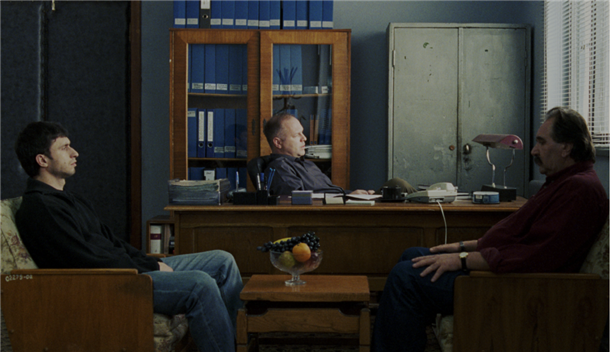
DS Did you think of the camera as a voyeur, not only on the youths but on the policeman himself, and maybe on consumers’ habits and behaviors? Was the camera-as-a-voyeur symbolic of the old regime? I saw lots of ways to look at how this camera followed everybody. What did you have in mind?
CP Of course I had this in mind, because the movie is about a guy who follows; so I liked this concept of following him, and I think for the movie, the feeling had to be that he was followed by someone else. And also he’s linked with my job, because we try to get stories out of us.
DS So you mean he’s followed by you, a filmmaker.
CP In a way, yes.
DS And your job is to follow.
CP Yes. And also this is a reflection on the genre, because the policier is always made like a puzzle to explain the intrigue. But I like to take all this out. Therefore, the title. I wanted to suggest in Romanian that it’s a movie. “Police” is an adjective for my movie. It’s not a substantive.
[In Romanian, the word ‘policier’ (coming from the French, referring to a crime story) does not exist; the word Romanians use for ‘police’ — ‘politişt’ — refers to both the man (a noun) and the film genre (an adjective). ‘Policier’ might have better conveyed Porumboiu’s concept for his title in English, but if it were translated Policier, Adjective, we’d lose the other part of the meaning, the reference to the man.]
Anyway, there are some untranslatable parts in this movie, like the section near the end about the words and their meanings.
DS So what is ‘police’ the adjective of? The genre and the man?
CP Yes, and of the State.
DS A police State?
CP Ya, in this definition, you know? Even now. It’s a way of thinking, and if you go back to the word and its various meanings, you see that, in the end, some of them are surviving; the word still carries some of these representations. In fact, each person has his own sense, his own point of view about the meanings of words — it’s more a problem that people don’t get each other. They all have their own interpretations.
DS Is one of these interpretations related to the old Eastern European culture we think of as a ‘police state’ with people are spying on each other and forced confessions, or were you not on that level in thinking of this adjective?
CP It’s more complicated. It’s really more complex than this, because it’s not like before, you know? Yet at the same time, we keep in our mind a certain way of wheeling needed to return to the past.
Now, in fact, we are free. But there can be this residue in our minds, which is more perverse. Before we had Ceaucescu, and it was something, you know; we had to fight against him, and it was black and white. And now, all of it’s in our heads. In fact all this structure, all this matrices we were born and raised with, function now in each one’s head, and for each one differently.
DS Do you think that filmmakers are behaving quite freely in Romania? Is there a film culture that is an avant-garde of a new hope and vision? Is there a way to talk about it at all?
CP I think now there are young directors. All of us are in the beginning of our careers; we’ve made one, two, or three films. Each one of us is trying to define himself in the world in which he lives. So you have points of view about Romanians today at one level, in an existential way, each one, so I think it’s a good period. It’s good for cinema. What will happen after this, it’s not my job to say. I don’t like to think that cinema has something messianic. I’m just making my movies…
Police, Adjective
Director: Corneliu Porumboiu; Producer: Corneliu Porumboiu; Screenplay: Corneliu Porumboiu; Cinematographer: Marius Panduru, R.S.C.; Editor: Roxana Szel; Production Designer: Mihaela Poenaru; Costume Designer: Giorgiana Bostan; Sound Designers: Alexandru Dragomir and Sebastian Zsemlye.
Cast: Dragoş Bucur, Vlad Ivanov, Irina Sǎulescu, Ion Stoica, Marian Ghenea, Cosmin Seleşi, Serban Georgevici, George Remes, Adina Dulcu, Dan Cogalniceanu, Costi Dita, Alexandru Sabadac, Anca Diaconu, Radu Costin, Viorel Nebunu, Emanoela Tigla, Daniel Barsan, Bungeanu Mioara, Cerasela Trandafir.
Color, 35mm, 113 minutes. In Romanian with English subtitles.